Ferguson
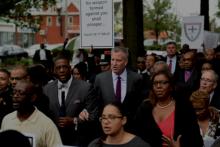
And here suddenly the letter lurches forward in time, slides through decades and lands squarely in our laps in 2015. It seems almost as if he isn’t talking about men and women of the past, but about Michael Brown, Eric Garner, Clementa Pinckney, Sharon Coleman-Singleton … the list is so sickeningly long.
He goes on to record injustices in Birmingham: “There can be no gainsaying of the fact that racial injustice engulfs this community. Its ugly record of police brutality is known in every section of this country. Its unjust treatment of Negros in the courts is a notorious reality. There have been more unsolved bombings of Negro homes and churches than in any other city in this nation.”
Wait. What are we talking about? Birmingham, or Cleveland? Ferguson? Charleston?
“Letter from a Birmingham Jail” has always itched at me, unsettled me. It bothers me because King isn’t writing to political leaders, but religious leaders, people of faith, people who follow the same Jesus as me.

Over the past year, #blacklivesmatter has taught me that the work of theology is not limited to the hallowed halls of academic institutions or sermonic reflections from prestigious pulpits on Sunday mornings. At community meetings and rallies, I learned new hymns in the form of movement chants. I learned that protest can be a form of prayer. #Blacklivesmatter is more than a hashtag. It is a call for repentance. It is an invitation into a state of prophetic grief and collective lament that does not anesthetize us from our pain but allows us to reconnect to the depths of our humanity by feeling, together, the torment our silence on issues of racial injustice has sown. It is only together that we will be able to actualize the transformation God is calling us to effect in this world.

When called to lead, Solomon didn’t seek his own glory, his own comfort, his own peace. Solomon sought the shalom of all his people. So, too, did the leaders above — and God said yes.
The movement to protect black lives gestated in the womb of our nation for years before Ferguson, but God birthed a movement in that place — in part because of wise and discerning leaders of faith.
May God help us all to enter the one year commemoration of Michael Brown’s death and the uprising in Ferguson, Mo., by reflecting on how we responded to God’s question a year ago: “What should I give you in the face of black death?”
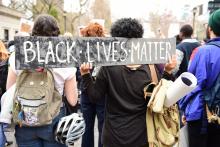
St. Louis County Executive Steve Stenger declared a state of emergency in Ferguson, Mo., today, urging County Police Chief Jon Belmar to “exercise all powers and duties necessary to preserve order, prevent crimes, and protect the life and property of our citizens,” the St. Louis Post-Dispatch reports.
The state of emergency comes after the arrests of at least 56 protesters, including prominent activists Deray Mckesson and Johnetta Elzie and famed writer Cornel West.
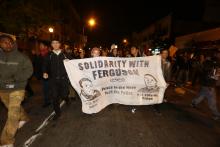
One year after the shooting and killing of Michael Brown, #FergusonTaughtMe is trending on Twitter. Activists, faith leaders, intellectuals, and everyday members of the movement have used the hashtag to explain how Ferguson fundamentally altered their racial consciousness. Embedded are a few tweets from Christian leaders who shared how Ferguson changed the way they do faith.
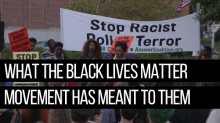
Sunday marked the 1-year anniversary of the killing of Michael Brown in Ferguson, Mo. Both in Ferguson, and across the country, the memorials and marches were held to remember those lost to police violence. Here in Washington, D.C., we attended one such demonstration and asked protesters what the #BlackLivesMatter movement has meant to them over the past year.

In honor of the one-year anniversary of Michael Brown’s death in Ferguson, Mo., Sojourners asked a variety of faith leaders — Catholics, Baptists, Muslims, agnostics, evangelicals, and humanists — to reflect: How has your faith been challenged, affirmed, or deepened by the Black Lives Matter movement? Has your theology changed? And, most importantly, what are we being called to do?
Here’s what they said.
ONLY SOCIAL MOVEMENTS really change history. Developing, nurturing, and supporting a new generation of leaders is central to the long-term success of these movements. As leaders like me get older and look to the future, mentoring young leaders is particularly important. More and more of my time is spent doing that mentoring, not only broadly but in relationship to particularly promising young leaders whom I have met. It is some of the most important and enjoyable work that I do.
For many years, Sojourners called together large conferences on biblical justice and peace. Thousands of people came year after year, and many positive things happened—new relationships, connections, projects, and organizations—even marriages and families! Now, several other groups are having justice and peace conferences, which is exactly the kind of “competition” Sojourners has always hoped for.
Last year, some of our younger staff came up with a great idea—to have a leadership “Summit” for people already providing leadership for the biblical vision of justice and peace. All the participants would have to be nominated by credible leaders doing this work, and instead of Justice 101 with big speakers and standing ovations, this would become a new, creative environment for moving justice agendas forward—Justice 202. We didn’t publicly advertise these gatherings—instead, the invitation spread by word of mouth as leaders, especially younger ones, were drawn together by experienced justice leaders who nominated them.

Even as the disciples of Jesus grieved at the foot of the cross, they understood there was work to be done. The work of justice is deeply political and requires an engagement in this present world. With tears in our eyes, we are called to march, rally, petition, sing, dance, create art, and use whatever gifts and talents we possess for the work of justice. The work of justice is deeply theological. Our church communities must foster a faith that gives people room to grow, to stretch, and to ask the tough questions. A grieving people need a theology for such a time as this, a theology that speaks to this present age. White churches, in particular, must end their silence and address the pain of grieving black lives, because the work of justice is collective. Even if you cannot possible understand all the reasons for our pain, you can come alongside a grieving people in love, humility, and solidarity.
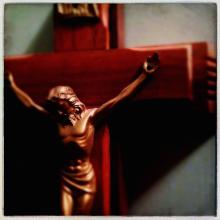
From Baltimore to Berkeley, people are asking the question. Do black lives matter? It has been a year and we cannot seem to find an answer to the question. “Of course they do” some people state. “Then why is it so hard for so many to be black or brown in this country?” is the question that follows.
"Maybe if they just pulled their pants up and turned the music down,” is a common enough retort. Then, as I hope you can see, we’re back where we started.
A young man walks into Mother Emmanuel AME Church and nine lives come to a tragic end. The “politics of respectability” cannot save black and brown lives either. You can be a respected member of the state government, a pastor, a grandmother, and none of that will matter. You can be president of the United States of America and it won’t matter. Your race will be a strike against you.
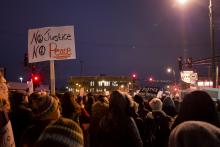
It's a call and response chant started on the streets of Ferguson that has spread across the nation.
"Mike Brown means ..."
"... we got to fight back!"
It rolls off my tongue in a sing-chant cadence, and my hips begin to sway, because I have yelled it as I've marched and rehearsed it in my dreams. It is bitter and sweet. We evoke Mike's name and sway and pledge to fight. I've listened to voices I know and those I don't call and answer in hours of live stream and together in front of court houses and I know, I know in my soul what Mike Brown means.
Mike Brown means ... something more. Something larger than one more young black man shot in his neighborhood.
One year later, Mike Brown means ... something more.
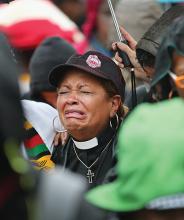
THE KILLING OF 18-year-old Michael Brown in Ferguson, Mo., last year and the events that followed sparked protests by the community in the St. Louis area asserting that black lives matter and ignited a discussion on race relations in the United States.
On the heels of non-indictments in the slaying of Brown and other black men, our nation focused its attention on the drastic inconsistencies inherent in our judicial system. To many observers, black lives had less standing in our nation than white lives.
Rodney King, Trayvon Martin, Mike Brown, Eric Garner, Tamir Rice, Walter Scott, and the churchgoers in Charleston, S.C., are part of a long list of black victims of violence. They are victims of an American narrative that devalues black souls, black lives, black bodies, and black minds. In response to these tragic events, particularly since the non-indictment of the police officers who killed Brown and Garner, many evangelicals have been calling for a biblical practice that is often absent in American Christianity—the call to lament.
On one level I am thrilled that evangelicals are discovering the importance of lament in dealing with racial injustice. However, I am concerned that the way lament is being used by some white evangelicals is a watered-down, weak lament that is no lament at all.
Lament is not simply feeling bad that Brown won’t be able to go to college. Lament is not simply feeling sad that Garner’s kids no longer have a father. Lament is not asserting your right to confront the police because, as a white person, you won’t be treated in the same way that a black protester may be treated. Lament is not the passive acceptance of tragedy. Lament is not weakly assenting to the status quo. Lament is not simply the expression of sorrow in order to assuage feelings of guilt and the burden of responsibility.
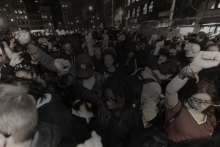
AUG. 9, 2014, is a day I’ll never forget. It was the day that Michael Brown was killed by Ferguson, Mo. police officer Darren Wilson.
For many young people in the United States, especially those of us involved in the Black Lives Matter movement, this was our Sept. 11. We all remember exactly where we were and what we were doing when the news broke of another police-involved killing of an unarmed black citizen.
I was in the final days of a yearlong internship with Sojourners. My fellow interns and I were on our closing retreat in West Virginia. I was on my phone checking my Twitter timeline when I began to see retweets of images: Michael Brown laid out on Canfield Drive with blood still leaking from his bullet wounds. I remember the anger that instantly came over me. “Not another one!” was all I could think.
As the day wore on, I felt frustrated that I was stuck in a retreat house, forced to sit idly by while the grieving community in Ferguson was antagonized by officers in riot gear with police dogs. I knew then that I had to do whatever it would take to join the people in this fight for justice. I never imagined how this movement would change the way I—and many others—actually do theology.
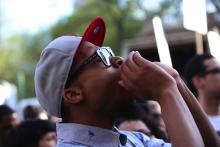
A "crisis management" report shows that a Baltimore cybersecurity startup, ZeroFox, singled out members of the Black Lives Matter movement as "threat actors" during the protests and rioting around Freddie Gray's death in April, Mother Jones reports. The report highlights two Black Lives Matter organizers, DeRay McKesson and Johnetta Elzie, terming their threat level "high" and "physical," urging "continuous monitoring." It also identifies Baltimore officials and law enforcement agencies for "asset protection."
This follows on reports in late July that the Department of Homeland Security has been comprehensively monitoring Black Lives Matter activities in Ferguson, Mo., Baltimore, Md., Washington, D.C., and New York, N.Y since August 2014.

The case of Missouri man Henry Davis against the Ferguson Police Department was reinstated by a federal appeals court on July 28.
Davis filed a lawsuit against the department in 2010, arguing he was wrongly mistaken for a criminal and physically assaulted by three white Ferguson police officers. With the lawsuit Davis included a photo that shows him bleeding from his head. This injury had resulted in Davis being charged with destruction of property for bleeding on the officers’ uniforms.
U.S. Magistrate Judge Nannette Baker halted his case in 2014 after saying his injuries weren’t severe enough to merit prosecution.
But on July 28 the U.S. Court of Appeals for the 8th Circuit ruled that Baker should not have dismissed Davis’ claims.
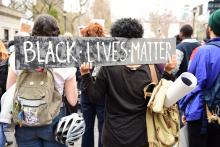
PEOPLE HAVE CALLED me a lot of things: Host pastor of the #BlackLivesMatter freedom ride; student of teenage and Millennial activists; leader of a state commission advocating policy change; bail negotiator; street agitator; and militant mediator. Since the Holy Spirit was poured out onto the streets of Ferguson, Mo., and St. Louis in the wake of Michael Brown’s death, I’ve been called and challenged to play these roles—and more.
Yes, I did say the Holy Spirit. The same Spirit that fell at Pentecost as a dynamic demonstration of God’s power to overcome the barriers of language, ethnicity, gender, class, and sexual orientation. The Spirit of hope that caused a community once rebuked for its broken dialect to speak with one voice. The Spirit of holiness that enabled a people dismissed for “drunkenness” (see Acts 2:15) to form the first fruits of the church.
We may have missed it because those the Spirit fell on nearly a year ago weren’t wearing robes and stoles, but hoodies and bandanas. They weren’t singing anthems and hymns, but chanting what some would call obscenities. They weren’t called saints and disciples by the media, but thugs and outside agitators.
But last summer, in the week between Michael Brown’s death on Aug. 9 and Missouri Gov. Jay Nixon’s declaration of a state of emergency on Aug. 16, the Spirit was poured upon “all flesh” and our sons and daughters began to prophesy.
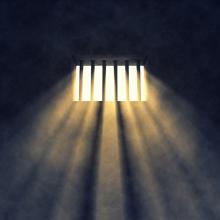
Week after week, we can take on the biggest issues we face as a society — from continuing racism, mass incarceration, inequality, and poverty to gender violence and human trafficking, climate change, ISIS — and just try to be hopeful.
Or we can start by going deeper, to a more foundational and spiritual understanding of hope — rooted in our identity as the children of God, made in the image of God, as the only thing that will see us through times like this.
I believe we should start there. Because the biggest problem we face — the biggest enemy at the heart of many of the issues we must address — is hopelessness.
And perhaps the most important thing the world needs from the faith community is today is hope.
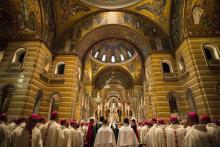
The president of the U.S. Conference of Catholic Bishops kicked off a gathering in St. Louis of approximately 250 of the nation’s bishops by referring to Ferguson.
“We mourn those tragic events in which African-Americans and others have lost their lives in altercations with law enforcement,” said a statement prepared by Archbishop Joseph E. Kurtz of Louisville, Ky., which was read by Bishop Ronny Jenkins, general secretary of the U.S. Conference of Catholic Bishops on June 10.
“Racism is an evil which endures in our society and in our church.”

The fight for the preservation of black and brown lives, that took unexpectedly deep roots in Ferguson and has now spread across nations, was a fight many of our students quickly came to lead, and folks like me have followed.
But many of these young people are not Christian, and frankly, the perception that local congregations lackadaisically approached this movement before it became a national headline — and brought a healthy, condescending dose of respectability politics and patriarchy along with their eventual involvement — is not making most of the millennial set excited about the prospects of salvation.
But local faith leaders like Rev. Traci Blackmon and Rev. Starsky Wilson, and others raised in faith like my friend Rich McClure and me, have clung to the radical example of Christ that guides our collective and individual action.
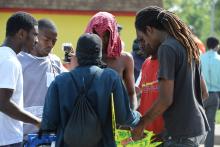
Socioeconomic reconciliation is the removal of gaps in opportunity, achievement, health, thriving, and well-being that exist between groups of people in our nation and world. In the face of myriad breaches of the common human bond and experience, a breakthrough act of the Spirit today would activate and agitate the established church in her ministry: a ministry of socioeconomic reconciliation.
The ministry of socioeconomic reconciliation will require a church empowered with tongues of fire and the gift of interpretation. These tongues must speak with a prophetic voice. But we must also have the heart and capacity to translate the words of marginalized communities into the language of policy, power, and program. That is why I thank God for the compelling, confusing roles I’ve been called into over the last nine months. This form of reconciliation requires the church to fulfill of the vocation of the militant mediator, which offers as much renewal in the streets and city hall as we experience in the sanctuary.